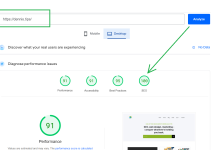In today's digital landscape, a strong online presence is crucial for any business. But simply having a website isn't enough. You need to make sure your website is visible to potential customers, and that's where SEO (Search Engine Optimization) comes in. SEO is the practice of optimizing your website to rank higher in search engine results pages (SERPs) for relevant keywords. The higher you rank, the more likely people are to find your website and learn about your business.
Here are 5 essential SEO tips to get you started and help your website climb the search engine ladder:
1. Keyword Research: Uncover What People Are Searching For
Before you can optimize your website, you need to understand what people are searching for. Keyword research is the foundation of any successful SEO strategy. It involves identifying keywords and phrases that your target audience is using to find information online. There are many free and paid keyword research tools available, such as Google Keyword Planner and Ahrefs.
Here are some tips for conducting effective keyword research:
- Focus on Long-Tail Keywords: Long-tail keywords are more specific than short-tail keywords and typically have lower competition. For example, instead of targeting the keyword “marketing,” you might target the long-tail keyword “content marketing tips for small businesses.”
- Consider Search Intent: When people search for a particular keyword, what are they hoping to find? Are they looking for information, a product, or a service? Understanding search intent will help you create content that is relevant and useful to your target audience.
- Incorporate Your Keywords Naturally: Don't stuff your content with keywords just for the sake of SEO. Google penalizes websites that overuse keywords. Instead, focus on creating high-quality content that naturally incorporates your target keywords.
2. On-Page Optimization: Make Your Website Search Engine Friendly
On-page optimization refers to the process of optimizing the individual pages on your website to rank higher for relevant keywords. Here are some key aspects of on-page optimization:
- Title Tags and Meta Descriptions: Title tags and meta descriptions are snippets of text that appear in search engine results pages. They play a crucial role in click-through rates (CTR). Your title tags should be clear, concise, and include your target keyword. Meta descriptions should be engaging and encourage users to click on your website.
- Headings and Subheadings: Use headings (H1, H2, H3, etc.) to break up your content and make it easier for users to scan. Include your target keywords in your headings naturally.
- Image Optimization: Images can improve the user experience of your website and make it more visually appealing. However, large image files can slow down your website's loading speed. Be sure to optimize your images by compressing them without sacrificing quality. Additionally, use descriptive file names and alt tags for your images. This helps search engines understand what your images are about.
- Internal Linking: Internal linking involves linking to other relevant pages on your website. This helps search engines understand the structure of your website and improves user navigation.
3. Content is King: Create High-Quality Content That Engages Your Audience
Search engines love fresh, high-quality content. By consistently creating valuable and informative content, you can attract new visitors, establish yourself as an authority in your industry, and improve your website's ranking. Here are some tips for creating great content:
- Focus on Your Audience: What kind of content are your ideal customers looking for? Create content that addresses their needs and interests.
- Provide Value: Your content should be informative, educational, or entertaining. It should solve a problem for your readers or provide them with something new to learn.
- Optimize for Readability: Break up your text with visuals, use short paragraphs, and bullet points to improve readability.
- Publish Regularly: Aim to publish new content on a regular basis. This shows search engines that your website is active and up-to-date.
4. Build High-Quality Backlinks: Get the Vote of Confidence
Backlinks are links from other websites to your website. Search engines consider backlinks to be a sign of trust and authority. The more high-quality backlinks you have, the higher your website will rank in search engine results pages. Here are some ways to build high-quality backlinks:
- Guest Blogging: Write guest blog posts for other websites in your industry. This is a great way to get your content in front of a new audience and earn valuable backlinks.
- Get Listed in Directories: Submit your website to relevant online directories.
- Create Shareable Content: Create infographics, videos, and other shareable content that people will want to link to.
5. Mobile Optimization: Cater to the On-the-Go Audience
With the increasing use of mobile devices, optimizing your website for mobile users is no longer optional – it's essential. Make sure your website is built using responsive design principles, so it adapts seamlessly to different screen sizes and devices. Fast Loading Speed: Mobile users expect websites to load quickly, so optimize your website's performance to minimize loading times. Readable Text: Use legible font sizes and avoid tiny text that requires zooming in to read. Tap-Friendly Buttons: Ensure that buttons and links are large enough and spaced apart to be easily tapped with a finger. Avoid Pop-Ups: Pop-ups can be intrusive on mobile devices and disrupt the user experience, so use them sparingly or avoid them altogether. In conclusion, implementing these SEO tips will help your website climb the search engine rankings and attract more organic traffic. By conducting keyword research, optimizing your website's on-page elements, creating high-quality content, building backlinks, and ensuring mobile-friendliness, you'll be well on your way to dominating the digital landscape. Subscribe to dennis.tips for more insights on how to rank your website effectively and stay ahead of the competition.





